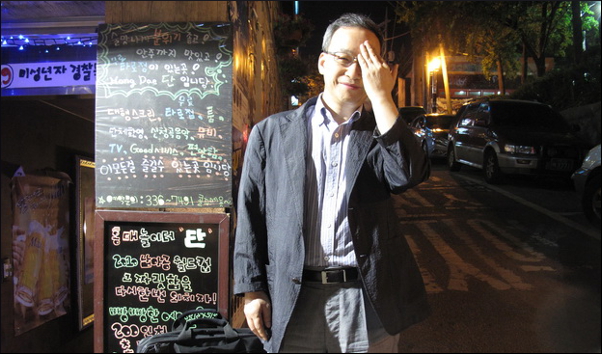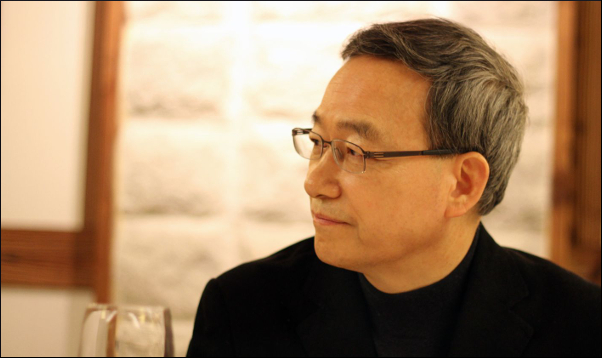
- The Person I Love
- Published by: Yullimwon publishers
- Level: Intermediate
- First Published in: 2008
A relatively modern poet, Ho-seung Jung’s work has been compared to that of 윤동주 (Dong-ju Yoon), 김소월 (So-weol Kim), and 한용운 (Yong-eun Han), some of the greatest Korean poets.

내가 사랑하는 사람 (The Person I Love) by 정호승 (Ho-seung Jung) is a poetry anthology first published in 2008 by 열림원 (Yullimwon) publishers. A relatively modern poet, Ho-seung Jung’s work has been compared to that of 윤동주 (Dong-ju Yoon), 김소월 (So-weol Kim), and 한용운 (Yong-eun Han), some of the greatest Korean poets. Ho-seung Jung has the uncanny ability to find poetry in the simplest subjects, and his pieces are unabashedly blunt and pure. Perhaps, the ease with which they can be read is the reason why he’s so popular. Some of the most famous poems in 내가 사랑하는 사람 include: the title piece “내가 사랑하는 사람 / Naega Saranghaneun Saram (The Person I Love), “봄길 / Bom-gil” (Spring Road), and “슬픔이 기쁨에게 / Seulpeumi Gippeumehgeh” (From Sadness To Happiness).
"Ho-seung Jung has the uncanny ability to find poetry in the simplest subjects, and his pieces are unabashedly blunt and pure. Perhaps, the ease with which they can be read is the reason why he’s so popular."
Very few of Ho-seung Jung’s poems require any historical knowledge. Most of his work is written in standard language, and “내가 사랑하는 사람” is a great starting point for anyone who wants to begin reading Korean poetry. In this piece, the author repeatedly uses the phrases “사람을 사랑한다” (I love that person) and “사람을 사랑하지 않는다” (I do not love that person). The type of love he means here is not romantic, but platonic. Take the following two lines, for example: “나는 그늘이 없는 사람을 사랑하지 않는다” and “나는 그늘을 사랑하지 않는 사람을 사랑하지 않는다.” Ho-seung Jung refers to “a dark side” or some sort of sadness through the term “그늘” (shadows). Notice the repetition of words and phrases, in which the same characters mean different things.

Also, the double negatives in both lines make readers linger on and figure out the meanings behind the phrases, emphasizing the fact that the poet does indeed love those who embrace their “그늘.” The poet reveals the irony of people having to love their own flaws for others to love them. “봄길” is another piece that contains ironic wordplay. The gist of this poem is that there is still a way for those who pave their own roads, even after their given “길” (road) ends. In contrast to the use of double negatives in “내가 사랑하는 사람,” “길” sets a positive and energetic tone by repeatedly using “~있다” (is there). Also, much natural imagery is employed to emphasize the etherealness of nature and the invariability of true love. Ho-seung Jung says, “사랑이 끝나는 곳에서도 사랑으로 남아 있는 사람이 있다” (There are people who become love themselves even when love ends). He goes on to state that rivers may stop flowing, birds may stop returning from their flight, and petals may scatter, but a person who becomes love walks along a spring road forever. There is no complicated historical background required to understand this poem. Its simple truth is its greatest forte.
"Ho-seung Jung is popular with younger generations. However, anyone can use the wisdom of his simple but powerful poetry."
“슬픔이 기쁨에게” is a poem featured in many Korean middle school textbooks. It is written from the perspective of personified “sadness,” speaking to personified “happiness.” Like the previous two poems, it uses simple language to elaborate on ironic themes. It is about the kind of happiness that causes sadness in others: “겨울밤 거리에서 귤 몇 개 놓고 살아온 추위와 떨고 있는 할머니에게 귤값을 깍으면서” (You, haggling down the price of tangerines with an elderly woman who battles the cold on the winter’s night selling tangerines, and feeling happiness). In this text, sadness is almost wise, talking about the “슬픔의 힘” (power of sadness).
It seems as though sadness is more powerful than happiness, not for destroying but for building. Ho-seung Jung is popular with younger generations. However, anyone can use the wisdom of his simple but powerful poetry. There are no difficult words or Chinese characters in his poetry, and the context of his pieces refers to nature or to various Korean landmarks, so there is not much studying to do before reading his work. This anthology is strongly recommended for those taking their first steps with Korean literature.

